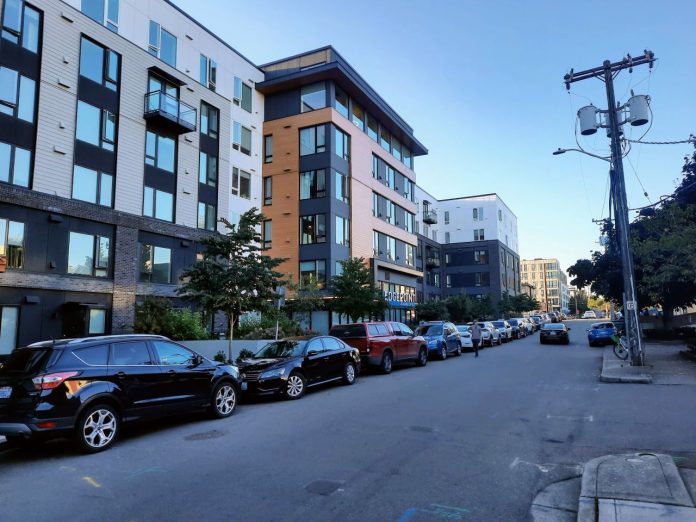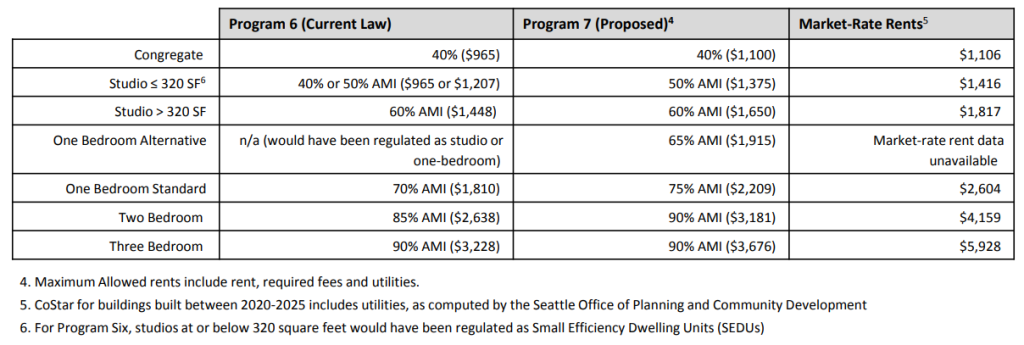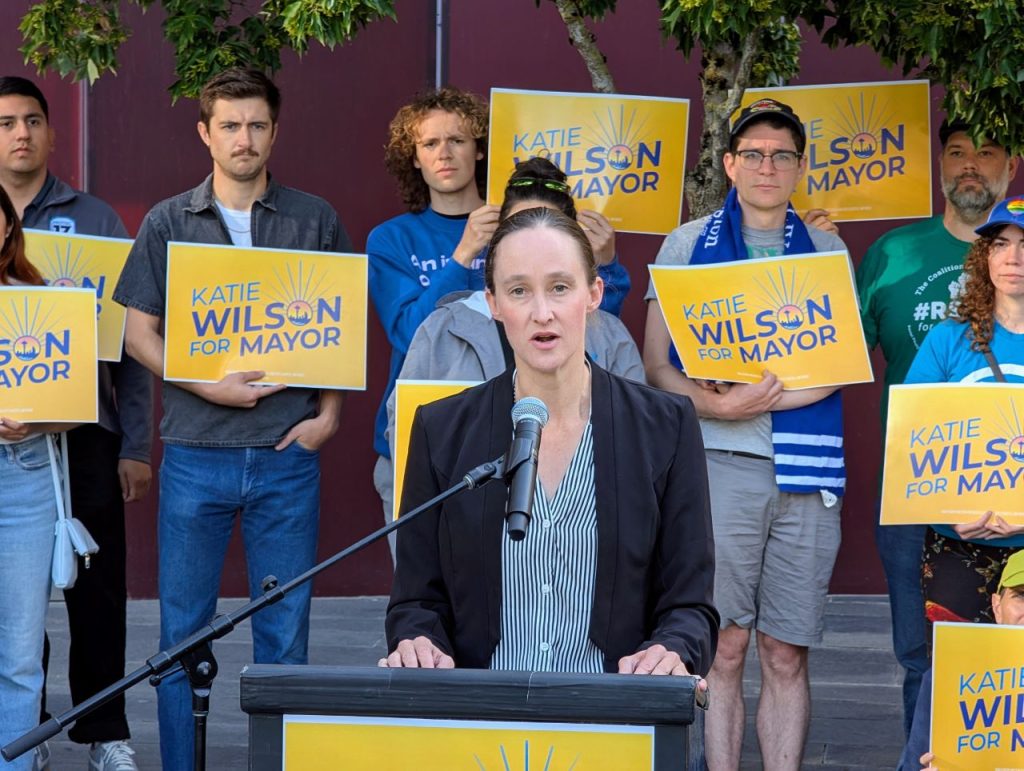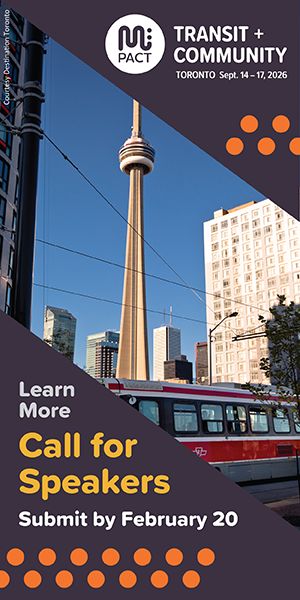
The Seattle City Council is set to finalize an extension of a major housing affordability program built on a property tax exemption, but a coalition of housing advocates is pushing councilmembers to reject the proposal and go back to the drawing board. Opponents argue the update would mean steep rent hikes for tenants currently in the program and expensive rents that barely qualify as below market in new units entering the program.
A final vote on the program modifications at the full council meeting at 2pm Tuesday, October 14, following a unanimous committee vote last month.
The vote and underlying policy update has been repeatedly delayed, causing a gap in the program. The current program expired on September 10, meaning builders opening new housing projects this fall do not have access to the tax exemption until the extension passes.
Across its six iterations, Seattle’s Multifamily Tax Exemption (MFTE) program provides nearly 7,000 homes at below market rents. Landlords receive a property tax break in exchange for setting aside a share of units as affordable — typically 25% in Seattle’s current program. The program is voluntary and landlords can opt out of the program, forgoing the tax break and returning units to market-rate if they so choose. The mayor’s proposal is the seventh iteration and often referred to as MFTE Program 7 or P7.
Thanks to a new state law, P7 continues to double the length of time that buildings can participate in the program. MFTE has traditionally allowed buildings to receive the tax incentive for up to 12 years, before buildings return fully to market-rate. Landlords can now apply for an extension for another 12 years. The rent limits for those extended units are slightly lower, under the logic that older buildings typically do not command premium rents like brand new buildings do.

In a 3-to-1 vote, housing committee approved an amendment from chair Mark Solomon (District 2) that raised the rents on larger studio apartment (320 square feet or greater) in P7 properties extending past 12 years from 55% of area median income (AMI) to 60% AMI, which is currently $1,650. That’s an increase of $138 over the working P7 proposal and $443 over the P6 cap.
Councilmember Rob Saka (District 1) proposed an amendment that would have lowered rent limits on extended P7 properties. However, he could not get a second, dooming his proposal. This led him to chastise his colleagues over the perceived lack of courtesy and fairness.
Just now in the Housing committee, after Rob Saka failed to get a second on an amendment he had proposed for the multifamily tax exemption (MFTE) program, he got visibly upset and asserted that "principles of fairness and comity demand" that he receive a second on any amendment proposals.
— Ryan Packer (@typewriteralley.bsky.social) September 22, 2025 at 11:08 AM
[image or embed]
Another successful amendment from Solomon allows developers that opened buildings in 2025 to opt into P7 program even if they certified into the P6 program. That would allow landlords to charge higher rents, though they would need to honor existing lease agreements on units that are already leased up.
The mayor’s P7 proposal had not included a sunset date, as past iterations have included, but Council amended the proposal to add a sunset clause in 2029 during the housing committee vote on September 22. Councilmembers Saka and Alexis Mercedes Rinck (Citywide Position 8) sponsored the amendment.
“The elimination of the sunset and the underlying legislation, I think, sends some mixed signals about the way in which we update MFTE,” Rinck said. “We need to continue to uphold the standard of updating MFTE on a regular basis to adjust to changes in development patterns, the market as a whole, which we know has certainly been in a [tough] place over the past year or so, but also to update in order to really reflect our need in different housing types for affordable housing.”
Permitting activity has plummeted in Seattle, and multifamily housing construction is down locally and nationwide. The industry has been weighed down by high interest rates and economic uncertainty tied to Trump tariffs and fears of a looming recession.

The P7 proposal appeared to have broad support on city council after Council’s housing committee advanced the program unanimously earlier this month. Council’s series of amendments made tweaks, but largely supported the mayor’s direction.
“We’re talking about three policy goals getting met here: more housing, workforce housing, and mixed income buildings all together in one program,” Council President Sara Nelson said. “And that is why I support so strongly the Multifamily Tax Exemption program, and I urge my colleagues support.”
Opponents criticize new MFTE program
However, P7 has also kicked up opponents, who have objected to higher rents and higher caps on rent hikes, among other program features. While the current ‘P6’ program caps rent increases at 4.5% for participating units, the P7 proposal would raise the cap to as high as 10%, depending on inflation. The less restrictive rent cap mirrors the state’s recently enacted rent stabilization policy — though that policy was aimed at blocking rent gouging rather than ensuring the long-term affordability of homes that were subsidized by tax incentives.
Under the P7 proposal, the maximum rent for a standard one-bedroom apartment in the MFTE program would increase from $1,810 to $2,209. The City contends this is about $400 less than the average market-rate rent for one-bedroom apartments in Seattle when including utility costs, which are included in MFTE rents. To tenants, $2,209 may not scream “affordable.” Proponents argue it’s one of the few programs providing workforce housing.

Among the opponents of the MFTE update is Katie Wilson, who is challenging Mayor Bruce Harrell from the left in the November election. Wilson won the primary, leading Harrell by nearly 10 points. The Urbanist’s elections committee (on which I serve along with 13 other members) endorsed Wilson.
“Instead of focusing city resources to build the affordable housing Seattle desperately needs, Bruce Harrell is championing changes to the MFTE program which would give developers millions of dollars of tax breaks to build housing that tenants can’t afford. Councilmembers should reject this proposal,” Wilson said in a September press release.
Wilson pledged to redesign the program with more input from tenants: “As Mayor, I will work with renters, housing providers, and private-market developers to improve the MFTE program so our city builds more of the kinds of apartments working families want, need, and can afford.”

Wilson’s campaign also made the case that Harrell favors landlords over tenants.
“Harrell notoriously said he ‘embraces the wealthy,’ and wealthy real estate interests have returned the embrace,” a Wilson campaign spokesperson said. “The major lobby group for the building industry has already contributed more than $100,000 to the pro-Harrell IE, and other developers, landlords, and real estate interests have invested tens of thousands more.”
A coalition of tenant groups and affordable housing advocates came out against the mayor’s P7 proposal as well. The coalition includes the Tenants Union of Washington, several affordable housing nonprofits, and the Transit Riders Union, which Wilson co-founded. The group sent a letter to the mayor and council on September 10.
“We, the undersigned, call on Seattle City Councilmembers and Mayor Harrell to reject this flawed and rushed proposal with no end date; to renew the current P6 MFTE for one year; and to develop a proposal that will actually make Seattle more affordable and create the types of apartments that our community needs. Decisionmakers must develop a new proposal in partnership with MFTE tenants and other crucial stakeholders.
The coalition noted that the tax incentive does not come cheaply.
“That tax exemption costs the city about $20 million per year in lost tax revenue, and increases property taxes for other taxpayers ($145 per year per median assessed value home),” they wrote. “The tax impacts continue to grow with the size of Seattle’s MFTE portfolio, which is almost $9 billion assessed value today (2024 Multifamily Tax Exemption Annual Report), and cumulative forgone revenue grows year over year.”
The Seattle Renters Commission also issued its own letter opposing the new program. In addition to objecting to the higher cap on rent hikes, the commission pointed out new units entering the program may not seem all that affordable to prospective tenants.
“There is no minimum size for one-bedroom apartments under P7, so developers will be able charge up to $2,209 for units that are smaller than 400 square feet,” the commission wrote.
The MFTE has also earned the ire of anti-growth activists and homeowner groups often critical “developer giveaways” that results in construction projects in their midst. As one prime example, long-time anti-housing activist Irene Wall wrote MFTE has “has outlived its usefulness” in an op-ed in the Seattle Times. She cited a 2024 University of Washington study, noting the foregone revenue for City offers and the higher property tax bills for homeowners.
In an action alert newsletter titled “Christmas comes early for apartment developers in Seattle,” Wall has been whipping up like-minded activists to attend the council vote on Tuesday.
In 2018, Wall also opposed Seattle’s Mandatory Housing Affordability rezone program, proclaiming that the city’s worst addiction problem was growth. For advocates like her, setting affordability requirements so high they discourage homebuilding would appear a desired feature, not a bug.
Finding the right balance
Advocates for homebuilders and landlords pushed back against an earlier proposal from the Seattle Office of Housing that would driven down rent limits, which they said would have curtailed participation in the program and killed housing projects. In fact, advocates pointed to a sharp drop in participation in the P6 program to argue the program had gotten out of whack with the realities in the industry right now. The Harrell Administration responded to this pushback and overhauled the rent limits proposed in P7.

Former Seattle Office of Housing director Miriam Roskin has argued the City went too far in other direction, favoring landlords.
“Some developers allege that without the proposed changes, they won’t participate in the MFTE program anymore. That’s OK, for if you reduce the program’s public benefit requirements to the extent that the tax incentive pays off for every developer, on every project, every time, you know you’re giving away the store,” Roskin wrote in a Seattle Times op-ed. “Policymakers should not take the bait.
Some housing advocates argue the biggest benefit of the MFTE program is as an added incentive for apartment development in the first place. Tax incentives take on extra importance as the housing industry is experiencing headwinds due to rising interest rates and climbing construction costs. The roughly 7,000 rent-restricted MFTE units come alongside more than 30,000 market-rate homes.
Getting the balance right between affordability for tenants and incentive for builders to is why the program is so complex and why the policy debate is so hard to untangle. So many variables go into housing development decisions that isolating the impact of the MFTE incentive is difficult, as studies have pointed out.
Given the discussions in committee last month, Council appears likely to approve the P7 program on Tuesday. If Katie Wilson wins election in November, she may be keen on revisiting the policy debate.
Update: This article was updated at 11:45pm Friday to add the chart of approved MFTE units and to note the decline in participation under P6.
Doug Trumm is publisher of The Urbanist. An Urbanist writer since 2015, he dreams of pedestrian streets, bus lanes, and a mass-timber building spree to end our housing crisis. He graduated from the Evans School of Public Policy and Governance at the University of Washington in 2019. He lives in Seattle's Fremont neighborhood and loves to explore the city by foot and by bike.


